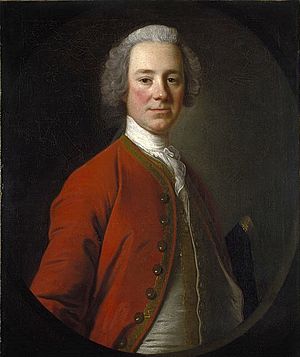John Campbell, 4th Earl of Loudoun facts for kids
Quick facts for kids
The Earl of Loudoun
|
|
|---|---|

The Earl of Loudoun
|
|
| Born | 5 May 1705 Scotland |
| Died | 27 April 1782 (aged 76) |
| Allegiance | |
| Service/ |
|
| Rank | General |
| Battles/wars | Seven Years' War |
General John Campbell, the 4th Earl of Loudoun (born May 5, 1705 – died April 27, 1782), was an important British nobleman and army general. He played a role in several major wars, including the Seven Years' War, which was also known as the French and Indian War in North America.
Contents
Early Military Life
John Campbell was born in Scotland in 1705. His father, Hugh Campbell, 3rd Earl of Loudoun, was a well-known figure. When his father passed away in 1731, John inherited his family's lands and titles, becoming Lord Loudoun.
Fighting in Scotland
In 1745, a rebellion known as the Jacobite Rising of 1745 broke out in Scotland. Lord Loudoun raised his own group of soldiers, called the Loudoun's Highlanders. This group joined the government's side to fight against the rebels.
His regiment had twelve companies, which are like smaller groups of soldiers. Lord Loudoun personally led eight of these companies in Inverness. In February 1746, he tried to capture the rebel leader, Charles Edward Stuart. However, a trick by only four rebels made Loudoun's forces think a large enemy army was waiting. So, they turned back without fighting. This event became known as the Rout of Moy. After this, Loudoun joined the main government army. He then helped clear out the remaining rebels after the important Battle of Culloden.
Leading in the Seven Years' War
The Seven Years' War was a huge global conflict. In North America, it was called the French and Indian War.
Commander in North America
In 1756, Lord Loudoun was sent to North America. He became the top commander of the British forces and the Governor General of Virginia. Many colonial leaders did not like him. He even closed all American ports for a short time when he found out some merchants were still trading with the French, who were Britain's enemies.
Despite his unpopularity, a new area in Virginia, Loudoun County, was named after him in 1757.
Planning the Louisbourg Expedition
As commander, Loudoun planned to attack Louisbourg, a strong French fort, in 1757. But he called off the attack. He received information, possibly a trick from the French, that suggested the French forces there were too strong. While Loudoun was busy in Canada, French forces captured Fort William Henry from the British. Because of this, Loudoun was replaced by James Abercrombie and returned to London.
Loudoun's Military Improvements
Many historians discuss Loudoun's role in the Seven Years' War. He made important changes to the army. For example, he replaced old muskets with more accurate flintlock muskets. He also improved roads to help supply the army and built large storage places for supplies in Halifax and Albany.
One of his most notable changes was combining regular British soldiers with local militias. He understood that these local fighters, called "irregulars," needed to fight differently than the traditional European style of warfare.
Benjamin Franklin's Stories About Loudoun
Benjamin Franklin, a famous American, wrote about his experiences with Lord Loudoun in his book, Autobiography. Franklin's stories often showed Loudoun's indecisiveness.
For example, Franklin needed to sail to Europe. Loudoun kept delaying the ship's departure for weeks, always saying his letters would be ready "tomorrow." Even though Loudoun seemed to be always writing at his desk, his work was never finished. Franklin compared him to a picture of Saint George on a sign: "always on horseback, and never rides on."
This constant delay meant passengers had to wait on their ships for weeks, using up their food supplies. Eventually, the fleet sailed towards Louisbourg. But even then, Loudoun kept the ships with him for five days before allowing some to leave. He then went to Halifax, practiced fake attacks, changed his mind about attacking Louisbourg, and returned to New York with all his troops and the remaining ships. During this time, the French captured a British fort, and many soldiers were killed.
Franklin wondered how someone so indecisive could be in charge of a large army. But he later realized that getting important jobs often depended on other reasons, not just skill.
Fighting in Portugal
In 1762, Loudoun was sent to Portugal. He was the second-in-command during the Spanish invasion. In 1763, he became the main commander. Although he could not stop the Spanish from taking the town of Almeida, the British forces soon fought back. They pushed the Spanish invaders back across the border.
Later Years and Legacy
After his time in Portugal, Loudoun returned to Scotland. In 1763, he was made the Governor of Edinburgh Castle, an important fortress. He held this job for the rest of his life. In 1770, he was promoted to the highest rank of full general.
Lord Loudoun was very interested in gardening and plants. His family estate became famous for its beautiful landscaping. He collected many different types of willow trees from all over the world.
Several towns in America were named in his honor:
- Loudon, New Hampshire was named after him in 1773.
- Loudonville, New York also carries his name.
- The town of Loudon, Massachusetts, was later renamed Otis.
John Campbell never married. When he died in 1782, his cousin, James Mure-Campbell, became the next Earl of Loudoun.
 | John T. Biggers |
 | Thomas Blackshear |
 | Mark Bradford |
 | Beverly Buchanan |

